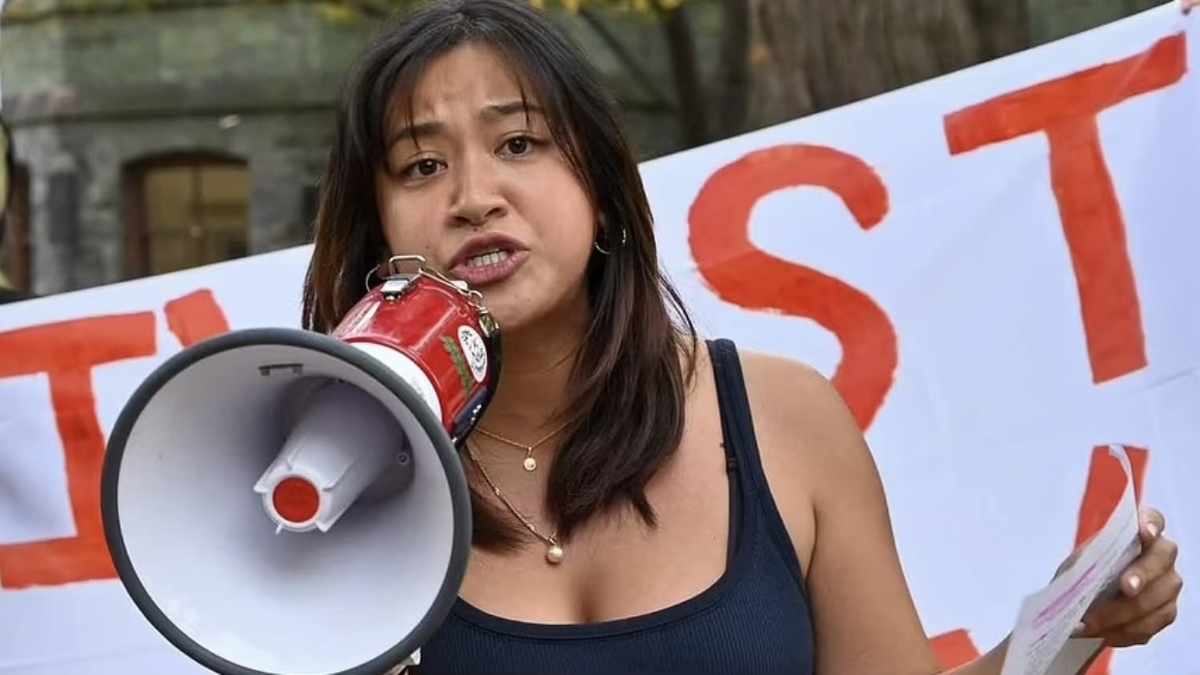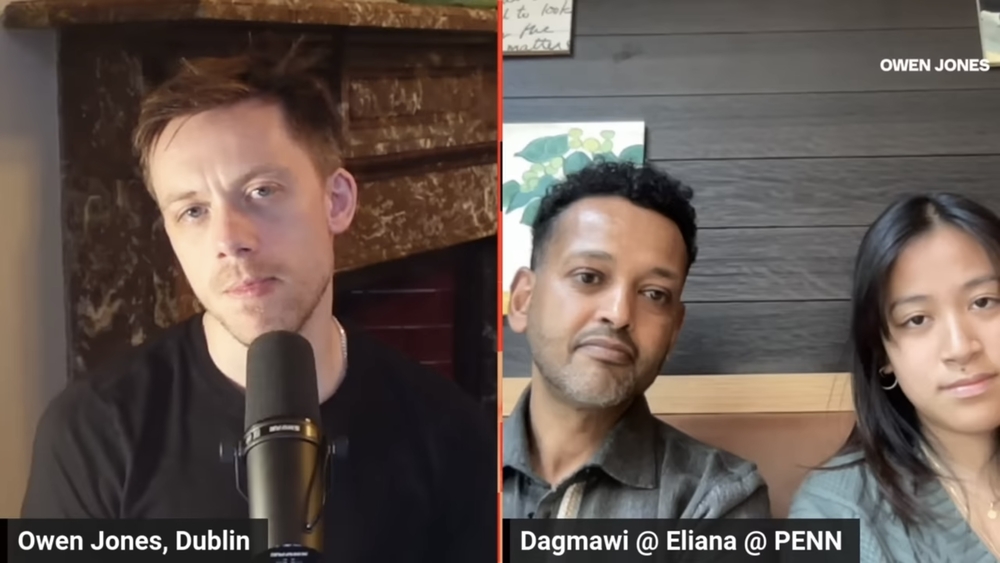
The reason? Her active role in anti-Israel protests.
In an interview with the Philadelphia Inquirer on May 21, 2024, Eliana revealed that she was forced to vacate her campus dorm and take a mandatory leave.
Eliana was quoted as saying, “I’m the only one made homeless by this,” adding that her friends had offered her assistance.
The interview was subsequently picked up by New York Post, Daily Mail in the U.K., News.com in Australia, among others.
ELIANA REVEALS “THREE DEMANDS” OF ENCAMPMENT
In a YouTube interview on May 12, 2024, with British columnist and commentator Owen Jones, Eliana was joined by Dr. Dagmawi Woubshet—a member of the Faculty for Justice in Palestine group—to talk about the story behind their encampment.

Eliana explained: “We began the encampment, and we have three demands that have remained throughout the entirety.
“One, to disclose investments from the University of Pennsylvania. Two, to divest from companies profiting off of Israeli genocide in Gaza. And three, to defend Palestinian scholarship, to defend pro-Palestinian speech on campus.
“We had set up the encampment with a goal to get these demands met. And as we’ve seen, the university has met us with violence and aggression.
“And it is a real travesty that that has happened.”
She likened being in such peaceful protest group to being in a learning environment, saying: “My biggest understanding of what the encampment was, especially us being in a university, it was literally a classroom.
“It was a space where Palestinian scholarship was embraced. It was a space that we students, faculty, community members created in an environment where the university has actively suppressed it.
“It was a space of learning, of a lot of art, a lot of music, and so much community that like, just thinking about it makes me very, very wistful even.”
REGARDED AS A THREAT
Nineteen-year-old Eliana, whose LinkedIn profile describes her as a “climate activist and community organizer,” expressed disappointment at how quickly their protest group was being reduced to a band of threatening aggressors.
In the same interview with Owen, the college sophomore said: “They [university] throw out the words outside agitators to characterize the people in the community that we’ve built as inherently dangerous.
“And to that I say, ‘Come to the encampment.’
“If you had actually been there, if you had actually seen the food that we had, the spaces that we shared, the music we created, it would have convinced you that we’re nothing but peaceful.”
BANNED FROM CAMPUS
Eventually, letters from the administration reached Eliana and a few others, hinting at the consequences of continuing with the protests.
“I and five other students have been taken up, been forced to take a mandatory leave of absence. But what that means is, it’s a ban on campus,” she revealed.
“In the letter that I received, it said ‘in extraordinary circumstances,’ but if a student’s presence has been deemed a threat to the order, health and safety and conduct of the university, they will essentially be asked to leave campus.
“And I am 19 years old, I live in a student dorm, and what that ban meant was that I couldn’t access my on-campus housing. I’ve been locked out of my dorm. I’m not allowed to access any dining hall, the library.”
She recalled, “I received it at 11 a.m., I think two days ago now. And that was directly in response to our encampment, I think, expanding to take more of the college green that we were currently on.
“The next day, I received an email. The email, it said in it, they will aim to give a hearing to allow students to have the opportunity to vouch for themselves. Something along those lines, none of the six got that hearing.
“We woke up one day and we’re banned from campus.
“And you see that in them characterizing us as threats to campus safety, health and order, is a deliberate characterization of us as dangerous.”
Eliana further asserted, “We are not dangerous.
“We’re all taking a stance against genocide.
“But the choice to characterize this as a threat makes me wonder, what are we a threat to? What are we threatening to?
“Are we threatening to the systems of oppression that have allowed this genocide to continue?
“Are we a threat to the donors who feel uncomfortable with how much we have shaken the foundation of the institution?
“Are we a threat to the, to the change and to the opposition to change?”
UPENN’S PAST PROTEST MOVEMENTS
For what it’s worth, Eliana reminded the university of its effective role in fighting for different campaigns over the course of its inception.
Eliana elaborated: “The university actively celebrates the winds of these, of these protest movements.
“So, we have the Women’s Center, which was won through protests.
“We have the African-American Studies, African Studies Program, which was won through protests.
“The Asian-American Studies Program won through protests, the LGBT Center won through protests.
“And it makes me, makes me want to beg the institution— ‘Remember, remember that you actively pride yourself on this in 50 years.’”
She also touched on the school’s tendency to only be participative and welcoming of particular things, ideologies, and concepts.
“You can see this physical manifestation of this power imbalance, particularly from donors throughout, I think, last semester… the two streets that kind of surround campus.
“There were these trucks that had people’s faces…
“And you see this abuse, this imbalance of power and money through these trucks that kind of paraded around campus and showed us what is OK to talk about, but what is not OK to talk about.”
Across the United States, several college campuses have been inciting protests amid Israel’s brutal response to Hamas’ attacks on the Jewish state on October 7, 2023.












